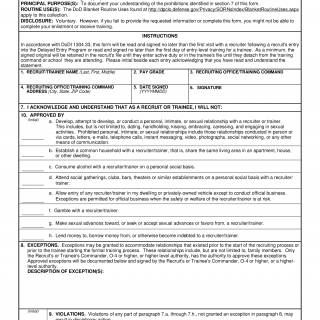DD Form 2983. Recruit/Trainee Prohibited Activities Acknowledgment
DD Form 2983, also known as the Recruit/Trainee Prohibited Activities Acknowledgment, is a form used by the Department of Defense to document that a recruit or trainee has been made aware of the prohibited activities that they are not allowed to engage in while in the military.
The main purpose of the form is to ensure that recruits and trainees are aware of the activities that are prohibited in the military, including drug use, fraternization, hazing, and other activities that could lead to disciplinary action. The form consists of a single page with a section for the recruit or trainee to acknowledge that they have been made aware of the prohibited activities.
The important fields on the form include the name of the recruit or trainee, the date on which the form is signed, and the signature of the recruit or trainee. The parties involved in the form are the recruit or trainee and the military personnel who are responsible for administering the form.
When filling out the form, the recruit or trainee will be required to provide their name and signature. No additional documents need to be attached to the form.
Application examples and practice and use cases for the form include new recruit training, as well as periodic training for existing military personnel. The form helps to ensure that all military personnel are aware of the prohibited activities and the consequences of engaging in them.
Strengths of the form include its simplicity and clarity in communicating the prohibited activities. Weaknesses could include the potential for recruits or trainees to not take the form seriously, leading to disciplinary issues down the line.
There are no direct analogues to this form, but related forms could include DD Form 2984, which is the Component Privacy and Civil Liberties Report, or DD Form 2910, which is the Victim Reporting Preference Statement.
The completion of this form can have a significant impact on the future of the participants, as it is stored in their military personnel records and could be used in disciplinary proceedings if the recruit or trainee engages in any prohibited activities.
The form is submitted to the appropriate military personnel responsible for administering it and is stored in the recruit or trainee's military personnel records.

